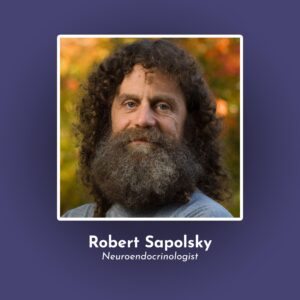
Show Summary
On this episode, neuroscientist and author Robert Sapolsky joins Nate to discuss the structure of the human brain and its implication on behavior and our ability to change. Dr. Sapolsky also unpacks how the innate quality of a biological organism shaped by evolution and the surrounding environment – meaning all animals, including humans – leads him to believe that there is no such thing as free will, at least how we think about it today. How do our past and present hormone levels, hunger, stress, and more affect the way we make decisions? What implications does this have in a future headed towards lower energy and resource availability? How can our species manage the mismatch of our evolutionary biology with our modern day challenges – and navigate through a ‘determined’ future?
About Robert Sapolsky
Robert Sapolsky is professor of biology and neurology at Stanford University and a research associate with the Institute of Primate Research at the National Museum of Kenya. Over the past thirty years, he has divided his time between the lab, where he studies how stress hormones can damage the brain, and in East Africa, where he studies the impact of chronic stress on the health of baboons. Sapolsky is author of several books, including Why Zebras Don’t Get Ulcers, A Primate’s Memoir, Behave: The Biology of Humans at Our Best and Worst, and his newest book coming out in October, Determined: Life Without Free Will. He lives with his family in San Francisco.
In French, we have a motto that says that a simple drawing is often better than a long explanation. Jean-Marc Jancovici Carbone 4 President
That’s very understandable because with left atmosphere thinking, one of the problems is that you see everything as a series of problems that must have solutions. Iain McGilchrist Neuroscientist and Philosopher
We can’t have hundreds and hundreds of real relationships that are healthy because that requires time and effort and full attention and awareness of being in real relationship and conversation with the other human. Nate Hagens Director of ISEOF
This is the crux of the whole problem. Individual parts of nature are more valuable than the biocomplexity of nature. Thomas Crowther Founder Restor
Show Notes & Links to Learn More
Download transcript00:20 – Robert Sapolsky Info + Works, Determined: A Science of Life Without Free Will
06:30 – Evolutionary mismatch
07:53 – History of the separation of mind and body (Dualism)
08:01 – Descartes
12:52 – Biological roots of religiosity
18:12 – Testosterone amplifies learned behaviors
20:45 – We give social status to aggression
22:02 – Dopamine is about the anticipation of reward
24:55 – Dopamine habituation
27:10 – Dopamin resetting
29:33 – Oxytocin causes familial attachment and eventually pair bonding and cooperation
30:45 – Dogs and humans secrete oxytocin when looking at each other
31:30 – Oxytocin makes us prosocial to our in-group and anti-social to our out-group
34:48 – Past stress levels affect current decisions that we make
35:58 – By the 3rd trimester the mother’s socioeconomic status is affecting a fetus’ hormones
36:50 – Daily temps in a city are a significant predictor of violence levels
37:13 – The structure of the brain is different between urban and rural residents
38:58 – Returns on investing in early life
39:45 – Non-mendelian inheritance of traits
40:40 – Societal adversity can have multi-generational effects
41:09 – Neuroplasticity
42:17 – What is free will?
42:26 – Behave: Biology of Humans at their Best and Worst
49:38 – Compatibilists
50:04 – Cognitive Dissonance
53:13 – Victor Frankl quote
56:10 – People treat ‘attractive’ people better
57:02 – African American men with more eurocentric traits are less likely to get convicted
1:12:15 – The prefrontal cortex
1:13:16 – Emergence
1:18:20 – Quantum Indeterminacy
1:19:25 – Charles Goodnight, multilevel selection
1:21:15 – David Sloan Wilson
1:21:30 – E.O. Wilson
1:24:28 – Meritocracy
1:28:17 – History of epilepsy
1:29:23 – Determinism, Fatalism, Nihilism
1:36:55 – Richard Dawkins – The Selfish Gene







